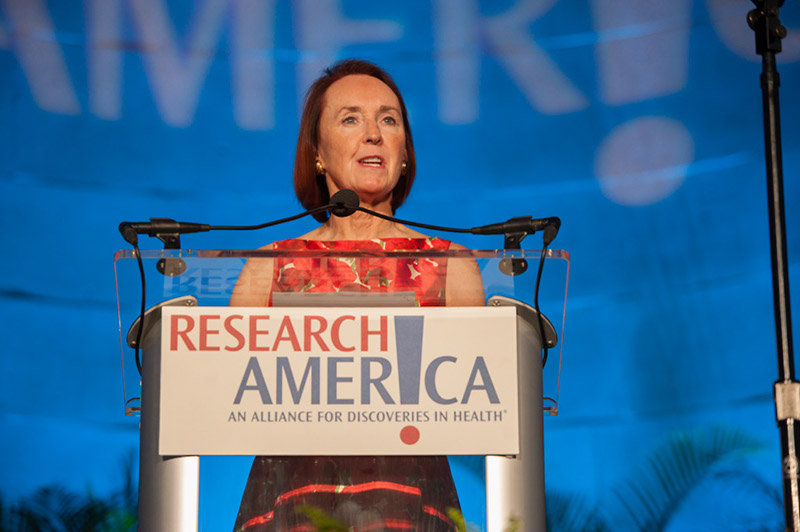Act to Reverse Declining Life Expectancy

Dear Research Advocate,
A report released this week by the Bloomberg American Health Initiative at the Johns Hopkins Bloomberg School of Public Health outlines 10 steps to reverse the decline in U.S. life expectancy (average U.S. life expectancy has dropped 2.7 years since 2019, erasing all gains since 1996). It is not all about COVID!
The report recommends specific public health interventions to save lives from COVID-19; overdose; gun violence; teen suicide; motor vehicle crashes; heart disease, stroke, and diabetes; and heat and other weather-related emergencies. It notes overdose deaths alone are responsible for 21% of the decline since U.S. life expectancy peaked in 2014.
As noted by Joshua Sharfstein, MD, Director of the Bloomberg American Health Initiative, “The stagnation and decline of U.S. life expectancy is not inevitable… By embracing solutions based on evidence, we can save lives, spread hope, and build momentum for a healthier and more equitable future.”
On the Hill: Congress must act to help reverse the decline in life expectancy, as well. It has limited time to act – the current budget deadline will likely push to December 23, only two weeks – before funding for the government expires.
Appropriations leadership met with President Biden on Tuesday to discuss the outlook for FY23. The House passed the National Defense Authorization Act by a vote of 350-80 this afternoon. If you haven’t been watching that important bill – defense is foundational, after all – you might not have noticed that the total $858 billion authorized to national defense is an increase of more than $80 billion over the FY22 appropriated budget. The increase alone is ~20% more than the total FY22 budgets of NIH, ARPA-H, CDC, FDA, NSF, AHRQ, and BARDA put together!
We think health security is just as important as defense. Congress should keep this big-picture, public-value context in mind as it considers increases for NIH and other federal health and science agencies.
Use this editable email to encourage Congress to complete FY23 appropriations ASAP and ensure our federal research agencies are able to continue the vital work already underway. A big “thank you” to the more than 170 organizations who joined our sign-on letter (sent to the Hill on Tuesday) making the same case to Congress.
Learning From Brazil: An illuminating opinion piece published in Undark this morning looks at the perils of deprioritizing and underinvesting in science, through the lens of Brazil’s tumultuous political and ideological shifts over the last decade. Daniel Henryk Rasolt writes, “[In addition to other factors], widespread disinformation has also catapulted anti-scientific ideologies into the mainstream in Brazil, and large portions of Brazilian society now distrust science and education.”
He also points out how gaps in support for science have generational consequences: “millions of students are losing an interest in education and science.” Paulo Artaxo, a physicist quoted in the article, articulates the situation: “‘The lost funds make work very difficult, but the lost minds make it nearly impossible.'”
It’s going to be a challenge to the incoming administration of President Luiz Inácio “Lula” da Silva to turn this situation around, but many are cautiously optimistic.
Security Toolkit Launched: A growing challenge for the global research ecosystem is the need to balance collaboration and openness, and maintain integrity – especially around leading-edge research and technology. The National Science Foundation joined federal and university partners to create the recently released Safeguarding Science toolkit to help the U.S. scientific, academic, and emerging-technology sectors in this effort.
Upcoming Obesity Briefing: Register to join us on Wednesday, December 14, at 11 a.m. ET for a virtual briefing focused on new approaches to treating obesity. An expert panel will discuss recent research developments that address the comorbidities of obesity, including cardiovascular disease and diabetes, and advances that provide new tools and strategies for those living with this disease. Please come with questions for our interactive Q&A.
ICYMI: On Tuesday, Carolee Lee, CEO and founder of Women’s Health Access Matters, joined us to discuss the need for targeted investment in women’s health research and the resulting economic and health benefits to society. Watch the recording.
In a short film from Johns Hopkins University, former Senator Barbara Mikulski talks about the groundbreaking bipartisan progress made in women’s health research policy in the 1990s.
Upcoming Alliance Discussion: Join us on Wednesday, December 14, from 4 – 5 p.m. ET, for a special discussion with Heywood Fralin, Chairman of Retirement Unlimited, Inc., and Michael J. Friedlander, PhD, Vice President of Health Sciences and Technology at Virginia Tech and Executive Director of the Fralin Biomedical Research Institute at VTC. Mr. Fralin and Dr. Friedlander are recipients of Research!America’s 2023 Gordon and Llura Gund Leadership Award.
Check out the list of 2023 Advocacy Award honorees and keep an eye out for future special discussions with other honorees. And mark your calendars for March 15, 2023, when we’ll be hosting the 2023 Advocacy Awards.
Stay well, stay safe, and stay connected.




